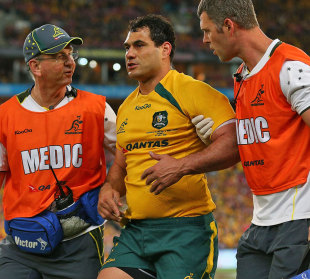|
International Rugby
IRB confirms continuation of concussion trial
ESPN Staff
August 9, 2013

The George Smith incident in the third Test of the Lions series brought concussion into the spotlight
© Getty Images
Enlarge
Pitchside Suspected Concussion Assessment (PSCA)
The International Rugby Board has opted to continue with its controversial concussion assessment protocol trial despite widespread concerns about its accuracy and allegations that players are cheating the test. The sport's governing body introduced the Pitchside Suspected Concussion Assessment (PSCA) last year as part of its bid to improve player welfare but has since been accused of endangering those that play the game. The test sees players who have suffered a suspected concussion leave the field for five minutes while the doctors determine whether they are fit enough to return to the pitch by asking the player a series of questions. If the player is suspected of having concussion he is not allowed to return to the game. Previously medics were forced to assess suspected concussion on the field with only players with blood injuries allowed to leave the field of play. The implementation of the PSCA prompted the resignation of former IRB medical advisor Dr Barry O'Driscoll who has since gone public with his criticism of the process, accusing his former employers of 'trivialising concussion' while insisting, "There is no scientific, medical or rugby basis for the safety of this process." The sight of Australia flanker George Smith staggering from the field following a head knock during his side's recent clash with the British & Irish Lions in Sydney, only to return to the fray a few minutes later sparked yet further criticism. Ex-Scotland international Rory Lamont labelled the PSCA as "flawed" while also revealing that players know how to cheat the tests and ensure they are cleared to play on. Adding to alarm, Dr Willie Stewart, a consultant neuropathologist at Glasgow's Southern General Hospital, has revealed what he believes to be clear evidence related to dementia in the brain of a male in his 50s who had played rugby. But despite these concerns over the concussion protocols, the IRB says "independent neurologists, rugby medics and the players' Union have given their unanimous backing to the IRB's PSCA protocol, recommending continuation of the current global trial in elite rugby". The trial will be extended for another 12 months with the IRB claiming the PSCA has seen a "25 per cent increase in players being permanently removed from the field of play following a head impact." IRB chairman Bernard Lapasset said he "welcomes the results of this review" and IRB chief medical officer Dr Martin Raftery defended the PSCA, saying: "There has been commentary in recent weeks regarding Rugby's approach to concussion management and incorrect assumptions have been made. "The IRB would like to reiterate that the PSCA process was developed in line with industry best practice to support the Team Doctors in assessing head injuries. It has not been developed to allow time for medics to look for reasons to clear a concussed player. The message to doctors and players is: if a player is clearly concussed then that player should be removed permanently, and there is no need for the PSCA." © ESPN Sports Media Ltd
|
Live Sports
Communication error please reload the page.
-
Football
-
Cricket
-
Rugby
-
- Days
- Hrs
- Mins
- Secs
F1 - Abu Dhabi GP
Abu Dhabi Grand Prix December 11-131. Max Verstappen ()
2. Valtteri Bottas (Mercedes)
3. Lewis Hamilton (Mercedes)
4. Alexander Albon ()
5. Lando Norris ()
6. Carlos Sainz Jr ()
-
ESPNOtherLive >>
Golf - Houston Open
Snooker - China Open
Tennis - Miami Open

